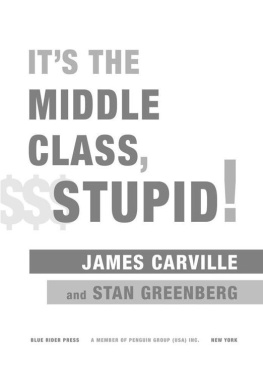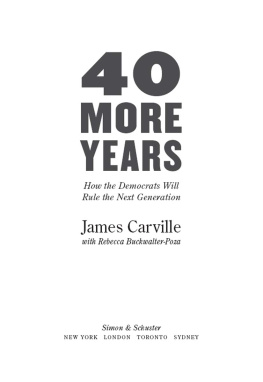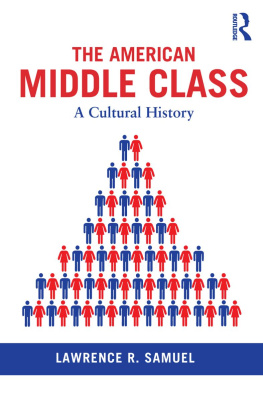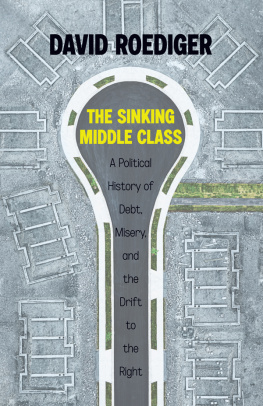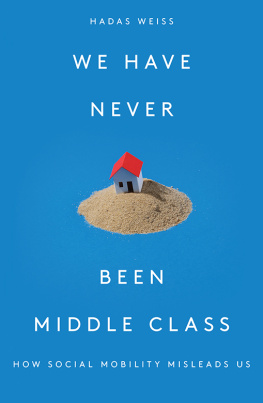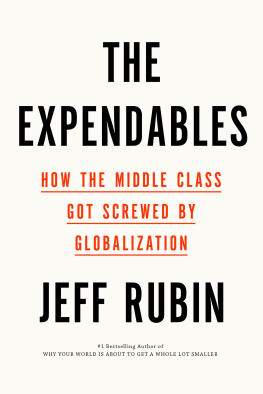ALSO BY JAMES CARVILLE
40 More Years
Take It Back (coauthored with Paul Begala)
Had Enough? (with Jeff Nussbaum)
Stickin: The Case for Loyalty
Buck Up, Suck Up... and Come Back When You Foul Up (coauthored with Paul Begala)
... And the Horse He Rode In On
Were Right, Theyre Wrong
Alls Fair (coauthored with Mary Matalin)
ALSO BY STAN GREENBERG
Dispatches from the War Room
The Two Americas
The New Majority
Middle Class Dreams
Legitimating the Illegitimate
Race and State in Capitalist Development
Politics and Poverty
ITS THE
MIDDLE
CLASS ,
STUPID !
JAMES CARVILLE
and STAN GREENBERG
BLUE RIDER PRESS A MEMBER OF PENGUIN GROUP (USA) INC. NEW YORK

Published by the Penguin Group
Penguin Group (USA) Inc., 375 Hudson Street, New York, New York 10014, USA Penguin Group (Canada), 90 Eglinton Avenue East, Suite 700, Toronto, Ontario M4P 2Y3, Canada (a division of Pearson Penguin Canada Inc.) Penguin Books Ltd, 80 Strand, London WC2R 0RL, England Penguin Ireland, 25 St Stephens Green, Dublin 2, Ireland (a division of Penguin Books Ltd) Penguin Group (Australia), 250 Camberwell Road, Camberwell, Victoria 3124, Australia (a division of Pearson Australia Group Pty Ltd) Penguin Books India Pvt Ltd, 11 Community Centre, Panchsheel Park, New Delhi110 017, India Penguin Group (NZ), 67 Apollo Drive, Rosedale, North Shore 0632, New Zealand (a division of Pearson New Zealand Ltd) Penguin Books (South Africa) (Pty) Ltd, 24 Sturdee Avenue, Rosebank, Johannesburg 2196, South Africa
Penguin Books Ltd, Registered Offices: 80 Strand, London WC2R 0RL, England
Copyright 2012 by Gaslight Inc. and Greenberg Research Incorporated
All rights reserved. No part of this book may be reproduced, scanned, or distributed in any printed or electronic form without permission. Please do not participate in or encourage piracy of copyrighted materials in violation of the authors rights. Purchase only authorized editions.
Published simultaneously in Canada
ISBN 978-0-399-16039-4
Marriage graph on page 56 and white nonmarital birth ratio by mothers education graph on page 57 copyright 2012 by Cox & Murray Inc., from Coming Apart: The State of White America, 19602010 by Charles Murray. Used by permission of Crown Forum, an imprint of Crown Publishers, a division of Random House, Inc.
Photo of Paul Ryan on page 187 AP Photo/Jacquelyn Martin.
While the authors have made every effort to provide accurate telephone numbers, Internet addresses, and other contact information at the time of publication, neither the publisher nor the authors assume any responsibility for errors, or for changes that occur after publication. Further, the publisher does not have any control over and does not assume any responsibility for author or third-party websites or their content.
To
Earl Long
and
Robert F. Kennedy
CONTENTS
WE ARE WRITING THIS BOOK BECAUSE WE FAILED AND THATS NOT GOOD ENOUGH
T heres no other way to put it. We failed. It is as simple as that. Both of us have spent our lives focused on whats happening with working people and seeing them get a fair shake for a hard days workseeing them get the chance to move up the ladder and be honored. We put the middle class at the center of the world, because you cant have an America without a middle class.
Well, we failed, and we have got to do better, and thats why we are writing this book.
You need to understand the Democratic Party and why people have been drawn to it over many decades and through so much of our history. Some joined because it was the party of working people that would stand up for the little guy against the big shots. Some joined because it was the party that stood up for the poor. Some because it was the party of rights for women, Latinos, immigrants, gays and lesbians, each in their timethe party tolerant of the countrys growing diversity. Some joined because it was more supportive of abortion. Some because of the environment and climate change. Some because of spending on the arts or whatever.
Those are all good and important reasons to embrace the Democratic Party, but they are not what has animated us through all the years of struggle. Our passion for Democratic politics began with race and racial equality. That shaped us like no other issue and upended the political world like no other. But, like Robert Kennedy, we quickly came to believe that our party would only succeed and have purpose if we put work, work values, and hardworking people of whatever color at the center of our efforts. Given our countrys history, that might take a lifetime.
The two of us could not be more different. James is tall and bald. Stan is a short guy who had a fro. And you could not have constructed more divergent personal journeys to our common passion. Stan grew up in working-class big-city neighborhoods and galloped through Harvard and Yale before putting his spotlight on the Reagan Democrats, the disaffected working class that felt betrayed by the Democratic Party. James grew up in small-town Cajun Louisiana, joined the Marines, and barely got passing grades in law school before he started running and winning campaigns. Both of us became convinced that Bill Clinton was the extraordinary politician who was trusted by African American voters and instinctively understood he had to honor and win over the forgotten middle class to lead the country.
James I grew up in Carville, Louisiana, in Iberville Parish, sixty-five miles north of New Orleans. Carville was barely a blip on the map back then, and the only thing that stopped folks passing straight through was the stop sign in the middle of town.
Carville was named after my paternal grandfather, who was accorded that honor because he was the postmaster, one of the three generations of our family to hold that position. He also owned a country store, which was a big deal in a place like Carville. The store and the post office were adjacent. I remember in my daddys time when he ran the store, if you wanted to buy a three-cent stamp, which was what a first-class stamp cost for most of the fifties (it went up to four cents in 1959), my dad would say, Fine, heres your stamp. Then if you wanted a loaf of bread and a quart of milk, hed walk you next door and sell you that. My momma, Miss Nippy, worked selling encyclopedias door-to-door. They were hardworking people.
My dad reckoned up two tills each night, one in the store and one in the post office. I think Washington got what was coming to it and the Carville kids got the rest. Mom and Dad could never make a lot of money when they had eight kids going in and out of the store: we pretty much ate up everything they had. I helped myself to a lot more soft drinks, candy, cookies, and sandwiches than I did stamps. I didnt have much use for those.
Its my guess that Carville was about 85 percent black, and for the first ten years of my life it was segregated. Whites and blacks went about their business separately. It might have been hard for an outsider to figure that Carville was divided along racial lines, because there werent actually any amenities to segregate. My father, Chester, employed a black man in his storesomething you never saw in the Southand we never used racial slurs in my family on instruction from my parents.
Because the biggest employer around was the federal governmentthe National Leprosarium in town was the nations premier center for the treatment of Hansens diseaseCarville was a different kind of place, and its safe to say I grew up in one of the more egalitarian places in the rural South, which might not be saying much.
Next page
